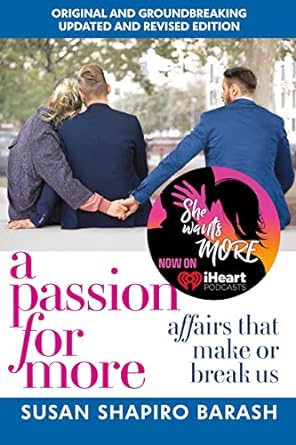More than 30 years ago, journalist Susan Shapiro Barash started talking to women, from 20-year-olds to 80-year-olds, about their affairs. She published the first edition of A Passion for More in 1993 and each year since has interviewed around 30 more heterosexual, cisgender sources. It’s not academic science, but it sure is something.
Some of the women’s stories fit societal narratives of who cheats and when: bored housewives, vengeful victims who’ve discovered their husbands’ infidelity and decided to strike back, and damaged children in grown-up bodies—those who were never loved well and don’t know how to love well. But A Passion for More largely tells a different composite story. Some women marry young. They are subsumed by motherhood. They’re ignored and undervalued. Their affairs aren’t initiated because they’re impulsive, reckless, or morally corrupt, and they don’t usually end in fiery balls of consequences and deep remorse. Rather, for the most part, taking a lover in these stories is a radical act of self-care by women who benefit and express no regret.
According to Shapiro Barash: “70% of women will engage in an affair of some kind at some point.” About half will leave the primary relationship and about half will stay. “For some, the lover is a bridge to another life, for others he is a method of renegotiating their commitment. For still others, both lover and husband/partner will co-exist.”
Quotes from the women reveal additional themes. Alice married a father-figure but then said, “Three years ago I no longer needed a father but a friend, partner, lover. Now I needed someone exciting and fun.” Lucy said, “From thirty-five to forty-five I’ve changed so much as a woman.” What they needed had shifted over the years.
Others never got what they signed up for. Abbie said, “I did love my husband, I really did. Except he was too busy to spend time with me…. He was married to his business…. I needed something now to feel like my old self again, to save myself.” For Eva, “There I was, married with children, financially secure and dead inside” with a husband who “was absorbed with his work, even sports events on TV…. He never listened to me; he never heard what I had to say,” she said. “Jeff, on the other hand, listened to every word…. I was trapped in a good life with something missing at the core.” Randy’s lover too “listens when I speak,” she said. Joanna’s husband traveled often. Susan’s “had little time for me.” Christine’s was a workaholic. So is Robin’s. And Sabrina’s. Priscilla said, “I became lonely…. When he was there, physically and paying some attention to me, it was enough. I was fulfilled. But when he became immersed in business … I really felt rejected and unhappy.” Julie said, “I began to realize that I needed a lot from a man that I wasn’t getting from my husband. Intimacy, communication, sex—I got it all from my lover.” For these women, the affair was a symptom of marital dissatisfaction.
Some found the roles in which they’d been cast stifling. Violet wanted “to be desirable still after being married with little kids.” Stephanie said, “I was the devoted wife, mother, daughter. Except I wanted more out of my life.” Regina said, “I had an obligation to everyone: our child, my parents, his parents, work, running the house.” When Camille’s baby was born, she gave up a career and autonomy. Her lover “brought out the creative, fun side of me, the wacky aspect, a part of me that had been lost for so long, taken over by the role of a doctor’s wife, a mother … not creating a new me but reviving the lost me.” She said, “I deserve more than to feel half-dead. If I hadn’t experienced this love, I would believe most love affairs are really only about sex. But I know how much more it is than that.” Rita said, “I needed affirmation of my womanhood.” Hanna said, “I’ve regained my identity.”
“He really brought me back to life,” Julie said of her lover. Honey “felt sexier than ever.” Vivien “suddenly felt terrific and really alive.” Anna saw it as “a healthy ego boost.” For Tess, the affair was an exercise in mindfulness, “I am smack in the middle of it while it is going on.”
For some, the affair reinvigorated or prolonged the marriage: “Sex is better with my husband; the relationship with my husband is better, because of the affair.” For Melanie: “Without the escape of the affair and the pleasure it gave me, I could not have tolerated life with my husband.” Anamarie said, “My mothering skills are even better, because I’m happier.”
Of course, there’s anxiety and guilt too. Some of Shapiro Barash’s interviewees felt torn. And others admitted they wished they’d sought therapy or an open marriage. As she quotes Dr. Bertram Slaff saying, “If you speak with 100 women, there will be myriad conscious and unconscious reasons for them to take lovers…. [T]he variations are enormous and one cannot generalize.” And yet, the women in her book largely aren’t befuddled Eves succumbing to a seductive serpent and forbidden fruit; their stories are permeated by a sense of entitlement and exploration, of fearless resolve, and often, of confidence and self reclaimed.
